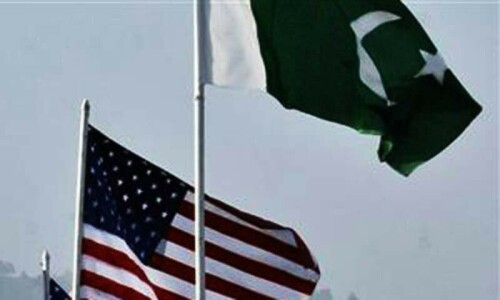• FO says bill not official stance of Washington, does not align with ‘current positive dynamics’ of Pak-US relationship
• Denounces export restrictions on 19 Pakistani firms, hails limited Ukraine-Russia truce
ISLAMABAD: The Foreign Office on Thursday downplayed the Pakistan Democracy Act, a bipartisan bill introduced in the US House of Representatives, saying that the proposed legislation did not reflect the official stance of the US government.
“The bill being introduced in the House of Representatives is an initiative of a single individual legislator. This is not the position of the US government,” Foreign Office Spokesman Shafqat Ali Khan said.
“We believe that the timing and context of the bill does not align well with the current positive dynamics of Pakistan-US bilateral relations based on mutual respect, understanding and non-interference in each other’s affairs,” he said, adding that the legislative process in the US Congress required multiple stages of approval before any bill became a law.
Reiterating the government’s commitment to democratic values and governance, the spokesperson stated, “Pakistan remains committed to constitutionalism, rule of law, protection of human rights and freedom of expression, because it considers democracy a vehicle for prosperity and progress as a nation.”
The Pakistan Democracy Act was introduced on March 24 by US Congressman Joe Wilson and co-sponsored by Jimmy Panetta. The bipartisan bill says that it aims to promote democracy, human rights, and the rule of law in Pakistan, citing concerns over the country’s February 2024 elections and the military’s influence over civilian governance.
The legislation proposes targeted sanctions against Pakistani officials, including the army chief, accused of undermining democracy and persecuting political opponents, notably ex-PM Imran Khan. The bill has been referred to the House Foreign Affairs and Judiciary Committees for further deliberation.
The spokesman also denounced the US imposition of export restrictions on 19 Pakistani firms, calling the move “biased and politically motivated”. The sanctions, which were announced on March 25, bar the affected entities from accessing US goods and technology without special authorisation.
“The imposition of export restrictions by the United States unfairly targets Pakistan’s commercial entities without any evidence whatsoever,” he said. “Such biased and politically motivated actions are counterproductive to the objectives of global export controls and obstruct the access to technology for socio-economic development.”
The US Department of Commerce’s Bureau of Industry and Security (BIS) added the Pakistani firms to its export control list, citing their alleged involvement in Pakistan’s ballistic missile and nuclear programmes. According to the BIS, these firms acted as procurement agents or front companies facilitating Pakistan’s strategic weapons programmes, often in collaboration with Chinese entities.
Pakistan has consistently denied accusations of illicit proliferation, maintaining that its nuclear and missile programmes comply with international norms.
TTP threat
The FO welcomed the United States’ latest intelligence assessment identifying Tehreek-i-Taliban Pakistan (TTP) as a potential threat, emphasising continued counterterrorism cooperation between the two countries.
“We welcome this acknowledgement of the threat TTP poses,” FO spokesperson Khan said. “And about the second point regarding US counterterrorism cooperation, there has never been a hiatus in that. It has been continuing, and it will continue in the days ahead.”
The statement follows the release of the US Director of National Intelligence’s Annual Threat Assessment 2025, which highlighted TTP’s growing operational capabilities and its ties to
Al Qaeda. The report warns that the group’s resurgence along the Afghanistan-Pakistan border could pose a future threat to American interests.
Russia-Ukraine ceasefire
Pakistan also welcomed the recent limited ceasefire between Russia and Ukraine, prohibiting attacks on energy infrastructure and ensuring safe navigation in the Black Sea, the Associated Press of Pakistan reported.
“Pakistan’s position on the Ukraine conflict has been consistent…We have always advocated dialogue and diplomacy, immediate cessation of hostilities and peaceful resolution of this conflict,” he remarked.
Published in Dawn, March 28th, 2025













































